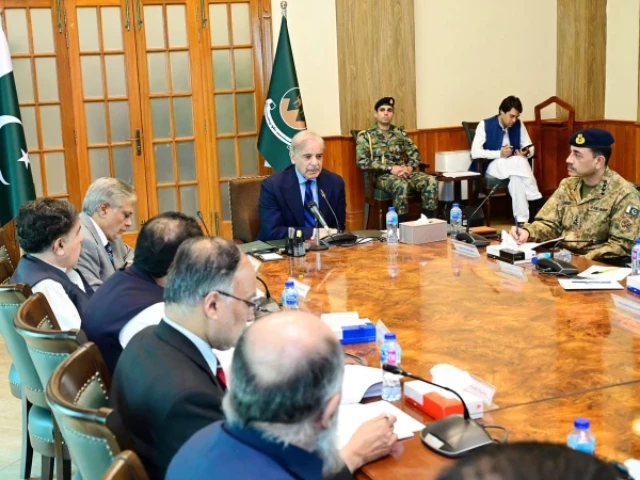'Time to eradicate anti-state conspirators, their facilitators': PM
Prime Minister Shehbaz Sharif addresses meeting of the National Action Plan (NAP) Apex Committee.

Prime Minister Shahbaz Sharif has stated that the time has come to eliminate the conspirators and their facilitators who are plotting against Pakistan.
Addressing a meeting of the National Action Plan (NAP) Apex Committee, the Prime Minister expressed his gratitude to the participants and emphasised the country’s role in global diplomacy.
During the meeting, Shahbaz Sharif noted that Pakistan had recently assumed a two-year term as a non-permanent member of the United Nations Security Council, which would provide the country an opportunity to play a significant role in international diplomacy.
He also highlighted the security challenges facing the nation, particularly the threats from hostile elements operating across the borders.
The premier referred to a recent attack from across the border, which was swiftly repelled by Pakistan’s security forces.
He also pointed out the foreign support behind certain elements conspiring against Pakistan, especially in regions like Khyber-Pakhtunkhwa and Balochistan.
The prime minister reiterated that achieving national progress and prosperity was contingent on maintaining peace and order across Pakistan’s four provinces, as well as in Gilgit-Baltistan and Azad Jammu and Kashmir.
He further stated that the time had come to completely eliminate the threat posed by extremist elements, referring to the ongoing issue of terrorism and sectarian violence.
The Prime Minister stressed the importance of a coordinated plan between the provinces, federal government, and defense institutions to strengthen national security.
He emphasised that the government would support any such initiative that aligned with Pakistan's national interests and contributed to the country’s betterment.
Shahbaz Sharif also addressed the growing digital threat, particularly the online propaganda against Pakistan.
He condemned the misinformation campaigns being run on social media by external agents and enemies of the state.
He noted that such campaigns, fueled by false narratives, were designed to undermine Pakistan’s image and create doubt about the country’s stability.
The Prime Minister specifically pointed to recent false narratives spread on social media following the attack on Islamabad, warning that failure to address this challenge would render all efforts futile.
Shahbaz Sharif also emphasised the sacrifices made by Pakistan’s security forces and reaffirmed that their efforts would not go in vain.
He urged all citizens to remember the importance of unity and collective action in overcoming challenges and ensuring Pakistan’s continued progress.
PM vows to tackle digital media challenges, and fake vews,
Prime Minister Muhammad Shehbaz Sharif also emphasised the need to confront the growing threat posed by digital media, particularly the spread of fake news and misinformation on social media platforms.
He termed this challenge as crucial for the elimination of terrorism and extremism from Pakistan.
The Prime Minister highlighted the role of certain foreign elements in spreading venom against Pakistan via social media.
"On the digital front, the venom against Pakistan is being spitted through social media by some elements abroad. This is a significant challenge, supported by distorted facts and twisted reality," he said.
Prime Minister Sharif stressed that misinformation on social media was undermining the state's image and raising harmful questions that could jeopardize efforts to combat terrorism.
"If we don't counter this challenge, all efforts to eliminate terrorism and extremism will go waste," he warned, expressing confidence in the government's ability to tackle these issues.
The Prime Minister referred to the spread of fake news about the martyrdom of Rangers personnel on November 26 as an example of how misinformation can cause harm.
He reaffirmed that the sacrifices of Pakistan’s armed forces were invaluable and would not go in vain, emphasising the country's ongoing commitment to peace, stability, and prosperity.
During the meeting, PM Shehbaz also congratulated the nation on Pakistan’s recent election to the non-permanent membership of the United Nations Security Council, underscoring the diplomatic achievement as a sign of Pakistan’s growing international influence.
The meeting, which was held to review the implementation of the 2021 National Action Plan, was attended by key federal ministers, Chief Ministers from all four provinces, Chief Secretaries, as well as the Prime Minister of Azad Jammu and Kashmir and the Chief Minister of Gilgit-Baltistan.
Additionally, the meeting is attended by Army Chief General Asim Munir, the heads of intelligence agencies, and the Director-General of the Federal Investigation Agency (FIA).
The National Action Plan, initially devised to combat terrorism and extremism, remains a crucial framework for the government to address these ongoing issues.
Previously, the Apex Committee of National Action Plan approved “Operation Azm-e-Istehkam” to eliminate terrorism and extremism across the country.
What is Operation Azm-e-Istehkam?
Operation Azm-e-Istehkam aims to eradicate extremism and terrorism decisively and comprehensively. It will coordinate and align efforts across multiple fronts to address the threats, while intensifying efforts to curb terrorist activities through regional cooperation within the political and diplomatic spheres.
The operation will bolster the armed forces' renewed and vigorous efforts with full support from all law enforcement agencies. Effective legislation will be enacted to close legal loopholes that hinder the prosecution of terrorism-related cases, ensuring exemplary punishments for offenders.
This campaign will be complemented by socio-economic measures aimed at addressing the genuine concerns of the populace and creating an environment that discourages extremist tendencies.
The forum reiterated that the fight against extremism and terrorism is Pakistan's own battle, crucial for the nation's survival and welfare. It was decided that no one would be allowed to challenge the state's authority without repercussions.
The forum also reviewed measures to ensure foolproof security for Chinese nationals in Pakistan. Following the prime minister's approval, new Standard Operating Procedures (SOPs) were issued to enhance the security framework for Chinese citizens in the country.



















COMMENTS
Comments are moderated and generally will be posted if they are on-topic and not abusive.
For more information, please see our Comments FAQ